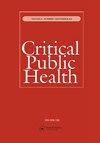充满挑战的时代:慢性病管理中患者和专业人员暂时性之间的脱节
IF 2.3
3区 医学
Q2 PUBLIC, ENVIRONMENTAL & OCCUPATIONAL HEALTH
引用次数: 3
摘要
摘要慢性健康状况是当代公共医疗面临的一大挑战。目前的政策促进自我管理支持,以减少对医疗服务的需求,改善患者的健康和福祉。尽管人们越来越认识到,自我管理是通过卫生专业人员和患者之间的合作实现的,但如何在互动中管理慢性病在研究中仍相对未得到充分探索。在这篇论文中,我们报道了一项研究,该研究考察了人们如何通过医疗遭遇来支持他们自我管理自己的病情。我们利用了来自患有多种慢性疾病的人和他们的医疗保健专业人员之间的咨询的观察性数据,以及对患者和专业人员关于这些咨询的半结构化访谈。我们阐明了患者和卫生专业人员之间的脱节点,并展示了这些脱节是如何在自我管理支持互动中展开的。我们认为,自我管理是暂时的和社会的,包括过去、现在和(预期的)未来的经历。然而,卫生专业人员制定的自我管理的时间逻辑与人们长期生活经历的主观时间性之间存在脱节。卫生专业人员关注的是患者朝着乐观的未来发展,但较少关注患者生活史的复杂性,这使得自我管理更加困难。为了使自我管理支持有效,我们认为卫生专业人员需要考虑人们生活史的复杂性,以及这些历史如何塑造想象中的未来。我们认为,政策指南应该关注患者和专业人员之间的关系如何影响自我管理支持,以及影响慢性病患者生活体验的历史和社会因素。本文章由计算机程序翻译,如有差异,请以英文原文为准。
Challenging times: disconnects between patient and professional temporalities in chronic condition management
ABSTRACT Chronic health conditions represent a key challenge for contemporary public healthcare. Current policy promotes self-management support to reduce demands on health services and improve patients’ health and wellbeing. Though there is emerging recognition that self-management is achieved in collaboration between health professionals and patients, how chronicity is managed in interaction remains relatively underexplored in research. In this paper we report on research examining how people are supported to self-manage their conditions through their healthcare encounters. We draw on observational data from consultations between people with multiple chronic health conditions and their healthcare professionals, and semi-structured interviews with both patients and professionals about these consultations. We illuminate points of disconnect between patients and health professionals and demonstrate how these disconnects unfold in self-management support interactions. We argue that self-management is temporally and socially situated, incorporating past, present and (anticipated) future experiences. However, there is a disjuncture between the temporal logics of self-management enacted by health professionals and the subjective temporalities of people’s lived experience of chronicity. Health professionals focus on patients progressing toward optimistic futures but give less attention to the complexities of patient life histories that render self-management more difficult. For self-management support to be effective, we argue that health professionals need to consider the complexities of people’s life histories and how these shape imagined futures. Policy guidelines, we argue, should attend to how relations between patients and professionals shape self-management support, and the historical and social factors that shape experiences of living with chronic conditions.
求助全文
通过发布文献求助,成功后即可免费获取论文全文。
去求助
来源期刊

Critical Public Health
Multiple-
CiteScore
5.90
自引率
7.10%
发文量
36
期刊介绍:
Critical Public Health (CPH) is a respected peer-review journal for researchers and practitioners working in public health, health promotion and related fields. It brings together international scholarship to provide critical analyses of theory and practice, reviews of literature and explorations of new ways of working. The journal publishes high quality work that is open and critical in perspective and which reports on current research and debates in the field. CPH encourages an interdisciplinary focus and features innovative analyses. It is committed to exploring and debating issues of equity and social justice; in particular, issues of sexism, racism and other forms of oppression.
 求助内容:
求助内容: 应助结果提醒方式:
应助结果提醒方式:


